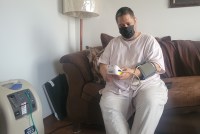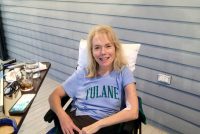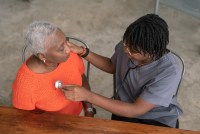Latest KFF Health News Stories
Urgent Care or ER? With ‘One-Stop Shop,’ Hospitals Offer Both Under Same Roof
Hospitals in several states are partnering with a private equity-backed company to offer combined emergency and urgent care in a single building. But patients may not realize prices vary between the two services — often by a lot.
Why Many Nonprofit (Wink, Wink) Hospitals Are Rolling in Money
Legal maneuvering, industry lobbying, and lax IRS oversight leave lots of room for “operating surpluses.”
A Tale of Two States: Arizona and Florida Diverge on How To Expand Kids’ Health Insurance
Both Florida and Arizona want to expand eligibility for the Children’s Health Insurance Program, known as CHIP, but their approaches to charging low-income families premiums for the coverage showcase the nation’s ideological divide on helping the disadvantaged.
Older Women Are Different Than Older Men. Their Health Is Woefully Understudied.
The White House has launched an initiative on women’s health. Studying the health of older women, a largely neglected group in medical research, should be a priority.
Amgen Plows Ahead With Costly, Highly Toxic Cancer Dosing Despite FDA Challenge
The FDA told Amgen to test whether a quarter-dose of its lung cancer drug worked as well as the amount recommended on the product label. It did and with fewer side effects. But Amgen is sticking to the higher dose — which earns it an additional $180,000 a year per patient.
The Burden of Getting Medical Care Can Exhaust Older Patients
It’s estimated that an older patient can spend three weeks of the year getting care — and that doesn’t count the time it takes to arrange appointments or deal with insurance companies.
Covid and Medicare Payments Spark Remote Patient Monitoring Boom
Demand for help monitoring patients’ vital signs remotely has taken off since a Medicare change in 2019. Dozens of companies now push the service to help overburdened primary care doctors — and as a revenue stream. But some policy experts say its growth has outpaced oversight and evidence of effectiveness.
How Your In-Network Health Coverage Can Vanish Before You Know It
One of the most unfair aspects of medical insurance is this: Patients can change insurance only during end-of-year enrollment periods or at the time of “qualifying life events.” But insurers’ contracts with doctors, hospitals, and pharmaceutical companies can change abruptly at any time.
Ouch. That ‘Free’ Annual Checkup Might Cost You. Here’s Why.
The designers of the Affordable Care Act might have assumed that they spelled out with sufficient clarity that millions of Americans would no longer have to pay for certain types of preventive care. But they didn’t reckon with America’s ever-creative medical billing juggernaut.
Preparing to Hang Up the Car Keys as We Age
As cognitive skills erode with age, driving skills weaken, but an aging driver may not recognize that. Advance directives on driving are one way to handle this challenge.
America’s Health System Isn’t Ready for the Surge of Seniors With Disabilities
More than a third of older adults have a disability. Many find it difficult to get the medical care they need. New federal regulations would address that problem.
Coping with disability — and the cost of coping with disability — is an enormously important issue for older adults. Nora Super, an expert on aging, shares her personal story.
Medicare Expands the Roster of Available Mental Health Professionals
Medicare is expanding access to mental health counselors and marriage and family therapists come Jan. 1. But the belief that seniors who suffer from mental health problems should just grin and bear it remains a troubling barrier to care.
Let’s Have an Honest Conversation About What to Expect as You Age
A leading geriatrician says a lot of health information for older adults isn’t as useful as it should be. No person’s aging process looks exactly like another’s. So she’s written a guidebook.
Feds Rein In Use of Predictive Software That Limits Care for Medicare Advantage Patients
Software sifts through millions of medical records to match patients with similar diagnoses and characteristics and then predicts what kind of care an individual will need and for how long. New federal rules will ensure human experts are part of the process.
The Shrinking Number of Primary Care Physicians Is Reaching a Tipping Point
The declining share of U.S. doctors in adult primary care is about 25% — a point beyond which many Americans won’t be able to find a family doctor at all.
Naming Suicide in Obits Was Once Taboo. Changing That Can Help Loved Ones Grieve.
Mental health is being talked about more openly than ever, but the word “suicide” has remained largely taboo when describing how someone died. See why that’s slowly changing, what it means for people who grieve those deaths, and how candor can help prevent additional suicides.
New Weight Loss Drugs Carry High Price Tags and Lots of Questions for Seniors
Although nearly 40% of Americans 60 and older are obese, Medicare doesn’t cover weight loss medications. Meanwhile, studies haven’t thoroughly examined new drugs’ impact on older adults.
Cardiovascular Disease Is Primed to Kill More Older Adults, Especially Blacks and Hispanics
Cardiovascular disease is the biggest killer of older Americans, with Black and Hispanic people at higher risk. Despite medical advances, researchers say, disparities are expected to worsen in the coming decades.
Denials of Health Insurance Claims Are Rising — And Getting Weirder
The Department of Health and Human Services is tasked with monitoring denials both by Obamacare health plans and those offered through employers and insurers. As insurers’ denials become more common, they sometimes defy not just medical standards of care but sheer logic. Why hasn’t the agency fulfilled its assignment?


























